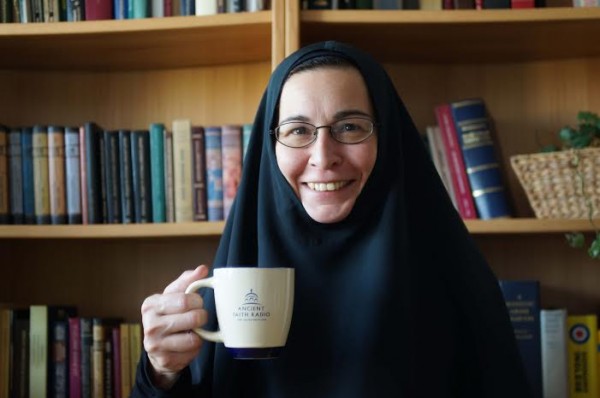Hello, I am Sister Vassa and I just came back to Vienna, Austria, after travelling first to the US and then on a secret mission to France.
Today I am drinking extra-fancy coffee that was sent to me by a viewer from Puerto-Rico named Jorje. The coffee is called “Yaocono,” and it is the best coffee in the world –– I know that because it says that right here on the label. Thank you to Jorje from Puerto-Rico for sending us this wonderful coffee. And, as you see, I am drinking my coffee once again from this now very famous mug that says “I don’t drink alone” on one side and, on the other side, it says: “I drink coffee with Sister Vassa.”
Now, we are posting at the end of each video your selfies of my zillions of viewers with this mug. So if you have the mug already, please don’t forget to send us your selfie, because we would like to post it at the end of our episodes. And if you don’t have the mug yet, please do support our show and order the mug at the website that you see here: www.healthyweb.net.
Now, you really should get the mug if you don’t already have one, just because it is the latest trend, and people are getting it all over the world. In fact, people are calling it the “World Cup.” (I am being told I am the only one who calls it that.)
In any event, I have some very good news for you and, if you’ve been watching this show, you’ve probably been waiting for this news, as I have. Here it is: Anka, our Polish site designer, and Emilios, who was previously our custom designer, are finally getting married. Yes, I don’t know the details yet, since I just found out after I came back from Paris last night. (As you see, my personal assistant still hasn’t unpacked my bags.) I don’t know where they will get married, because (as you know) Emilio is Greek Orthodox and Anka is Roman Catholic.
In any event, I am really happy to be back in Vienna now, especially since my secret mission to France didn’t go all that well. But do I regret going there? No, I don’t regret it.
Speaking about France, today we will talk about a very important saint and early Church Father who was bishop of the city of Lyon in the second century, St. Irenaeus. He was the first to reflect extensively on the very unpopular aspect of Christianity called “the Church.”
Have you ever thought about this topic? Have you ever thought about who needs organized religion?
Well, he thought about it. It is very interesting to hear what he had to say about it already in the second century. Although our brief reflection on his life and works will be very incomplete and won’t answer nearly all the questions surrounding this issue, it will get us to thinking and it will shed some light on certain aspects of it.
St. Irenaeus was probably Greek and was born to a Christian family some time in the early second century near the city of Smyrna in Asia Minor. His mentor was the martyred bishop, St. Polycarp of Smyrna (+155-160), who was a disciple of St. John the Evangelist, the youngest of the Twelve Apostles and an eye-witness of Christ’s Passion on the Cross.
In Irenaeus’s time, Lyon was called Lugdunum, and it was an important capital of an area of the Roman Empire called Gaul. Incidentally, Roman Gaul, a couple of centuries earlier, is the city for the comic character called Asterix. (I think my writers thought that was relevant to the story somehow.) This area was Christianized by Greeks from Asia Minor like Irenaeus, who settled in and around Lugdunum in large numbers, because Lugdunum was such an important center for trade.
In the year 177, there was a massacre of Christians in Lyon, during which the local bishop, Pothinus, who was from Asia Minor, was martyred. Here you can see the ruins of the Roman amphitheatre in Lyon, where Christians were killed by wild animals while a mob of Roman citizens watched.
Irenaeus then succeeded St. Pothinus, the martyred bishop, as the second bishop of Lyon. We know very little of Irenaeus’s activities as bishop, although we do know that he was very respected and influential well beyond the borders of his own local church. It is reported, for example, that in the year 190 or 191 he influenced Pope Victor I of Rome not to excommunicate the Christians of Asia Minor for celebrating Easter (or Pascha) on a different day from Rome. At that time, you see, the Christians in Asia Minor and the Christians in Rome and other areas celebrated Pascha on different days. However, as St. Irenaeus pointed out in his letter to Pope Victor, this difference in the various church calendars was not a reason to disrupt church communion. I’ll repeat that: St. Irenaeus did not think that the difference between church calendars was enough to disrupt church communion.
St. Irenaeus’s most famous work is called “Adversus haereses,” meaning “Against the Heresies,” and is mostly directed against a specific sect of so-called “Gnostics.” There were many very fashionable sects and cults at that time, which we now call “Gnostics.” When Christianity first emerged, it emerged among a swarm of these mystical and metaphysical sects, mostly from the East.
The particular Gnostics against whom Irenaeus’s wrote attempted to make Christianity compatible with the more fashionable beliefs of that time, taking bits of Christian teaching and combining them with ancient philosophies and mythologies. They even composed their own Gospels. The word “Gnostic,” in case you didn’t know, comes from the Greek word gnosis, which means “knowledge.” The Gnostics against whom Irenaeus wrote his work believed that they possessed a special secret knowledge, including a special knowledge about Christ, which was not accessible to the rest of mortals in the four Gospels, which Irenaeus insisted were the canonical Gospels. This group of Gnostics also had a view of God that we call “dualism” –– that means that they actually believed in two gods: a perfect, good god; and another evil, imperfect god whom they called Demiourg and who, according to them, was the god of the Old Testament and also the creator of the material world, of which the Gnostics had a very pessimistic view. They also had a pessimistic view of humankind: they divided all human being into three classes (please don’t fall asleep now, this is going to get interesting).
The first, and the highest class were the “Spirituals” (pneumatikoi), the elite which alone would achieve salvation through secret knowledge. Of cause, the Gnostics placed themselves into this category. The second category were the “Psychics” (psychikoi): these were members of the Church who, according to the Gnostics, could not achieve salvation, but they could be somewhat improved through faith and good works. And the bottom, third class, were the “Materials” (hylikoi), the total losers for whom there was no hope.
Against the very pessimistic view of the Gnostics about the material world, Irenaeus stressed the redemption of the entire physical world through the Incarnation of Christ, Who unified the physical and the spiritual, the human and the divine, in His Person. Christ also gave to the whole of humankind — not excluding anyone — the very real, invisible possibility of communion with His Divine nature in the Eucharist, that is, when we partake of His Body and Blood.
“For,” writes Irenaeus, “just as the bread which comes from the earth is no longer ordinary bread after God is called down upon it, but is now the Eucharist, consisting of two things, the earthly and the heavenly, so also are our bodies, when we receive the Eucharist, are no longer corruptible, possessing the hope of resurrection.”
Against the religious elitism of the Gnostics, Irenaeus stressed the inclusiveness of the Church, which spread through the missionary work of the Apostles, who were taught by Christ Himself and received the grace of the Holy Spirit and then passed on this grace through missionary work throughout the Roman Empire. The bishops and presbyters instituted by the Apostles in the various local churches then carried on the work of the Apostles, passing on the Apostolic Tradition — including the Scriptures — to new generations throughout the history of the early Church of Irenaeus’s time in a visible continuity of Church life, which could be historically traced. Thus, Irenaeus appeals to history as a witness to a visible Church Tradition and structure, which was in no wise some secret society accessible to a select few.
Now, there is a lot more to say about St. Irenaeus, but I’ve already exceeded our usual ten minutes, so as our thought for today, let’s remember the inclusive aspect of the Christian phenomenon called the Church, which remains in this world as part of it, not as a self-isolated elite, but rather like that bit of “yeast” that Christ talks about, that is “added to lots of flour, until it worked throughout the whole of the dough” (Mt. 13:33)
Let’s also remember that there is nothing new about religious elitism which, like a broken record, keeps popping up throughout Church history, both from within and without the Church.
That’s it for today, ladies and gentlemen: St. Irenaeus of Lyon.

















